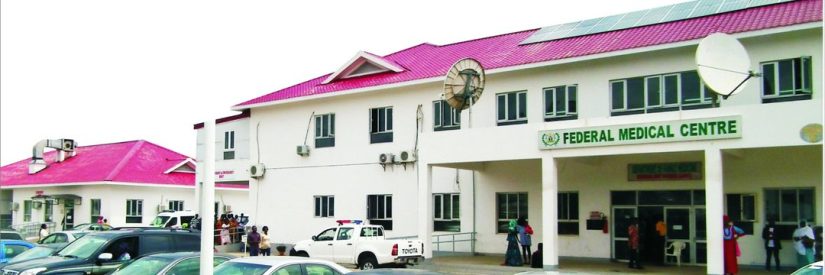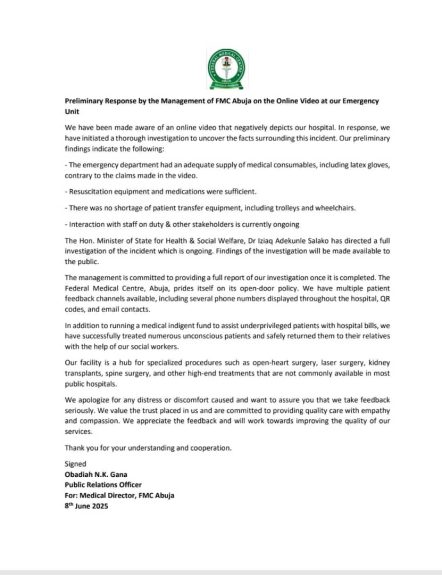
Daniel Otera
A recent viral video showing alleged neglect of road accident victims at the Emergency Unit of the Federal Medical Centre (FMC), Jabi, Abuja, has sparked renewed outrage and prompted a federal investigation into the state of emergency care across public hospitals in Nigeria’s capital.
In the video, which circulated widely across social media platforms, a man claiming to be a good Samaritan is seen accompanying severely injured accident victims into the FMC Abuja emergency facility.
He accuses hospital staff of refusing to render prompt assistance, citing the absence of protective gloves. Although the footage later shows some victims receiving basic attention and being ushered into the unit, the initial delay has reignited long-standing concerns over how medical emergencies are handled in Nigerian public hospitals.
In response, the Federal Ministry of Health and Social Welfare announced that a full-scale investigation had been ordered by the Minister of State, Dr Iziaq Salako.
A statement issued by FMC’s Public Relations Officer, Obadiah Gana, confirmed that the hospital had launched an internal probe and was currently gathering evidence from on-duty staff and other stakeholders.
Preliminary findings, the hospital said, indicated there were no shortages of essential items such as gloves, medications, or emergency equipment.
The hospital also maintained that trolleys and wheelchairs were available and claimed its response protocol met acceptable standards. FMC Abuja further reiterated its commitment to transparency, noting the existence of multiple feedback channels, including phone lines, QR codes, and email addresses publicly displayed within the hospital.

Yet the video has revived painful memories of the September 2023 case of Greatness Olorunfemi, a young woman who reportedly died after being denied emergency treatment at Maitama District Hospital following a “one chance” attack along Katampe-Kubwa Road. Despite an official panel later stating she was brought in dead, public trust in the emergency response system has been shaken, with many Nigerians perceiving these cases as symptoms of a broken system.
Nigerian law explicitly prohibits the refusal of emergency medical treatment based on the absence of a police report. This is backed by the Compulsory Treatment and Care for Victims of Gunshots Act, 2017, passed by the National Assembly and signed into law on 20 December 2017.
Section 1 of the Act states:
“As from the commencement of this Act, every hospital in Nigeria whether public or private shall accept or receive for immediate and adequate treatment with or without police clearance any person with a gunshot wound.”
The law further mandates that hospitals must notify the police within two hours after commencing treatment not before.
This legal provision was enacted to address the rising number of avoidable deaths resulting from the insistence on police documentation prior to emergency care.
Although Nigeria’s laws prohibit hospitals from refusing emergency care due to lack of police report, real-world implementation remains inconsistent. As seen in both the FMC Jabi and Maitama incidents, hospital staff are sometimes hesitant or unclear about the legal and procedural obligations when handling trauma patients especially those brought in by bystanders.

In many cases, fear of police scrutiny or medico-legal complications has led to delays or outright denial of treatment. Studies on accident and emergency (A&E) services across Nigeria highlight that non-clinical barriers such as administrative indecision or fear of legal consequences remain a persistent issue in life-saving interventions.
According to the National Health Facility Survey (NHFS) 2023 conducted by the National Bureau of Statistics (NBS), less than 35 percent of public hospitals across the country have fully functional emergency units equipped with essential drugs, medical consumables, and 24-hour staffing. In the Federal Capital Territory (FCT), the situation is even more dire, with fewer than a dozen health facilities reportedly equipped to manage trauma cases around the clock.
The NHFS also found that only 22.8 percent of facilities in the North-Central zone where Abuja is located possess the basic emergency equipment necessary for critical care.
These gaps in readiness may explain the recurring pattern of hesitation or refusal in emergency units, despite existing health regulations and ministerial directives.
In the aftermath of the 2023 Maitama controversy, the panel of inquiry established by FCT Minister Nyesom Wike concluded that Greatness Olorunfemi was already deceased when brought to the hospital.
CCTV footage, it said, showed that the hospital began examining her within 40 seconds of arrival, though it admitted that the evaluation took place inside a vehicle rather than in a professional clinical setting.
The panel stopped short of indicting any staff member but recommended a full autopsy and a review of emergency protocols. It also called for greater sensitivity in handling corpses, after revelations that the deceased was left unattended for a considerable period before being transferred to the morgue.
That incident, like the current FMC case, drew massive attention online, with users questioning the widening gap between policy and practice in Nigeria’s public health system.
The FMC Abuja video may be just one of many incidents that occur regularly without public exposure.
While authorities promise transparency and improvement, many Nigerians continue to face barriers to life-saving medical care due to institutional lapses, resource mismanagement, and outdated procedural norms.
